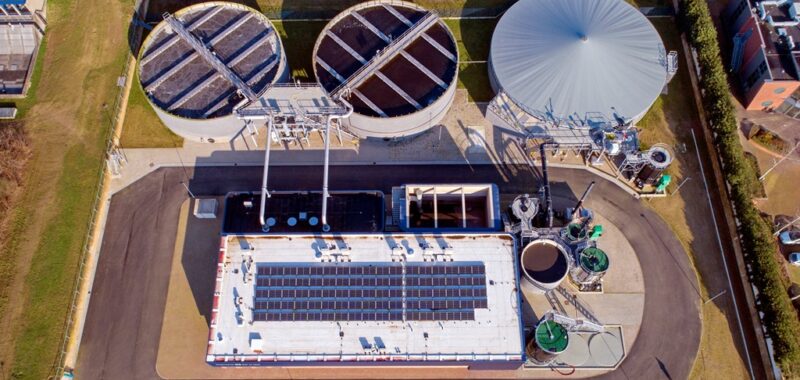United Utilities is turning to Dutch technology to extract commercially useful biopolymers from sewage.
Royal HaskoningDHV, a Dutch engineering company with offices in the UK, is managing the installation of the UK’s first Kaumera pilot plant in Blackburn to extract biopolymers from sewage sludge.
Blackburn wastewater treatment works already uses Royal HaskoningDHV’s Nereda aerobic granular sludge technology which uses 50% less electricity than conventional aerobic treatment processes to purify wastewater.
Kaumera Nereda gum is a new bio-based raw material that is extracted from the sludge granules that form during the Nereda purification process. It is a gel that can retain water but also repel it. This opens up a host of industrial, agricultural and water-related applications. Its water-repellent properties could make Kaumera an excellent coating for concrete floors. Or it could be used as a composite building material, with flame-retardant properties that could also make it a useful additive.
The extraction technology, developed with Delft University of Technology, is already in plants in the Netherlands and Portugal. Installation of the extraction plant in Blackburn will take place later this year. The project will run until March 2027.

With funding from Ofwat’s Innovation Fund, UK water companies and potential customers will join forces to assess the technology to recover biopolymers and their viability for use in a host of commercial applications from fertilisers to curing concrete. If successful, the pilot project could change the economics of wastewater treatment and enable water companies to generate revenue streams from the extraction of natural bio-chemicals.
“Biogas is already extracted from sewage sludge but adding the recovery of useful biopolymers moves the industry higher up the value chain – it’s potentially game-changing,” said Paul Lavender, UK water utilities director at Royal HaskoningDHV. “The global liquid polymer market is worth $1.27 trillion annually and is highly fossil fuel dependent, yet the nation’s water treatment plants offer us a natural source of biopolymers. This new pilot project won’t just demonstrate the extraction technology but will develop use cases by involving the whole supply chain including academia, commercial product developers, and blue-chip end-users.”
Partners in the project include United Utilities, Severn Trent Water, South West Water, Royal HaskoningDHV, CirTec Cellvation, AquaMinerals, Yara, Glasgow Caledonian University and Cranfield University.
United Utilities chief engineer Lisa Mansell said: “This project will explore the recovery of biopolymers such as those from cellulose in toilet paper to naturally derived biopolymers and will be a great example of a circular economy. It will also test the viability of generating new revenue streams, which could help us drive down our operating costs and ultimately benefit customers. We are very excited about exploring the possibilities of circular wastewater treatment technologies and applications for a more sustainable future.”

